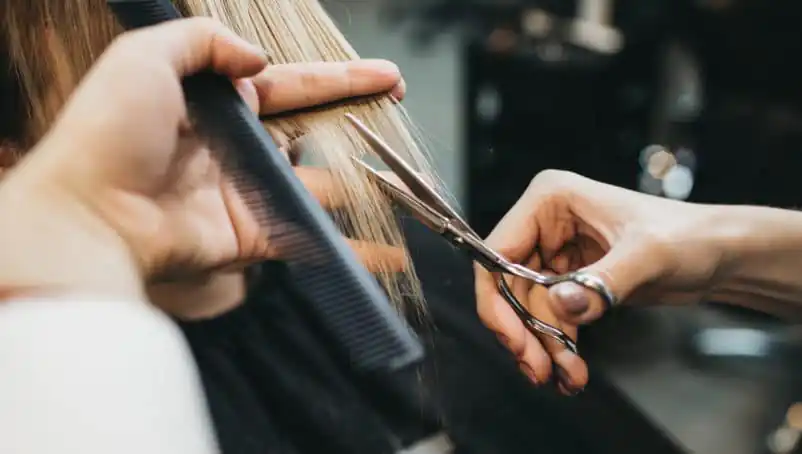What are self-employed hair stylist taxes?
While W2 employees automatically get taxes taken out of each paycheck, self-employed hairdressers handle their own tax payments. That means you’re in charge of calculating what you owe and making sure your money gets to the Internal Revenue Service (IRS).
Most self-employed stylists pay quarterly estimated taxes and then file an annual return. Your state taxes and federal taxes depend on three main factors:
- How much you earn
- Your marital status
- The state where you operate
Tax deductions are one of the best perks of being self-employed. They lower the amount of income you actually pay taxes on. When your taxable income is less, you end up paying less in taxes.
For example, if you earn $10,000 in a year but spend $2,000 on deductible business expenses, you only pay taxes on $8,000. Those scissors and styling products can put money back in your pocket by lowering your tax payments.
Typically, you’d use the Schedule C tax form to report income and expenses from your business.
While managing your own income and taxes gives you more control, it also means you’re responsible if something goes wrong — like if a client claims the dye you used damaged their hair. Fortunately, having hair stylist insurance can help protect you if a client claims you caused damage or made a mistake. It is also usually tax deductible.
As tax rules change regularly, this guide reflects commonly available guidance as of 2025.
What are some tax write-offs for the beauty industry?
Some people assume they can deduct every business expense, but that’s not quite how it works. But you still have plenty of opportunities to save. The IRS looks for two main things when it comes to barber, hair stylist or cosmetology tax deductions:
- Business expenses that keep your daily operations running; or,
- Investments that help your business grow
The IRS calls these “ordinary and necessary” expenses. In plain English? If it’s common in the beauty industry and helps you run your business, it probably qualifies. Think styling tools, booth rent, and professional products.
But keep in mind that, even when something is tax-deductible, there may be limits on how much you can claim.
For example, you can only deduct so much for business-related entertainment, charitable donations, automobile mileage, and even your self-employed retirement plan.
Quick tip: If you use a vehicle for business purposes, like making house calls for weddings — standard personal auto insurance typically won’t cover accidents that happen while driving for business. You’ll need commercial auto insurance to be fully covered (the premiums are often tax-deductible, as well).
For the most up-to-date rules on what is and isn’t deductible, check the IRS’s website or ask your accountant to confirm.
10 hair stylist tax deductions
Your styling skills pay the bills, now let’s make sure you’re not overpaying on taxes. Here’s your complete guide to hair stylist write-offs that could save you money.
1. Hair stylist insurance
Insurance premiums that help protect your business generally count as tax write-offs for the beauty industry. For instance, your hair stylist insurance can protect you from the business risks you face when working with clients and help lower your taxable income.
Essential insurance coverage for beauty professionals includes:
- General liability insurance: Can help protect your business if someone is injured or their property is damaged, such as a client slipping on a wet floor or tripping over equipment in your workspace. It’s often the first layer of protection for everyday accidents.
- Commercial property insurance: May help cover the cost to repair or replace your equipment, products, furniture and other business property if they’re damaged by events like fire, theft or vandalism. This is especially important for salon owners who invest heavily in tools and supplies.
- Workers’ compensation insurance: Can help cover medical expenses, lost wages and related costs if an employee gets hurt or becomes ill because of their work. Most states require this coverage for businesses with employees, including salons.
- Commercial auto insurance: May help cover accident-related costs when you’re driving for business purposes, such as mobile styling appointments, supply runs or traveling between locations. Personal auto policies typically don’t apply to work-related driving.
A Business Owner’s Policy (BOP) combines general liability and commercial property coverages into one package, often at a better rate than purchasing them separately.
Most states require certain types of coverage for salon owners — check your local regulations to confirm.
2. Car mileage and vehicle use
Vehicle expenses may be tax write-offs if your business keeps you on the road, whether for work-related supply runs, mobile styling services, or traveling between locations. Here’s what you can typically deduct:
- Gas and maintenance costs
- Parking fees and tolls
- Vehicle depreciation
- Auto insurance premiums
- Vehicle registration and licensing
- Public transportation expenses
Note that regular commuting to your primary workplace isn’t deductible, but travel between work locations or for business errands usually is.
The standard mileage rate for business use is 70 cents per mile in 2025. Watch for updated 2026 tax season mileage rates from the IRS in December.
Remember that if you use your personal vehicle for business, your regular auto insurance may not provide enough coverage. Consider a commercial auto insurance policy for proper protection (and you can include the cost as a business expense on your taxes).
3. Tools and supplies
Of all the barber tax write offs and stylist deductions available, tools and supplies are often the easiest and most common. This includes the essential equipment and supplies you use every day:
- Professional scissors and shears
- Blow dryers and styling tools
- Styling chairs and stations
- Sinks and mirrors
- Supplies like shampoo, conditioner and styling products
- Professional wear like smocks and aprons
For example, replacing worn-down shears mid-year or stocking up on color supplies for bridal season.
Just make sure to keep your receipts — they’re your proof for business taxes (in case you get audited) and insurance claims.
4. Continuing education and professional development
Keeping up with hair trends and improving your skills is always good for business. Plus, it’s good for your tax return.
The beauty industry moves fast, and the IRS recognizes that continuing education is part of running a successful styling business. You can deduct costs for:
- Hair industry workshops and seminars
- Styling and coloring technique classes
- Trade shows and conventions
- Online courses and webinars
- Professional magazine subscriptions
- Industry certification programs
For conferences and training, think beyond the price of admission — you can often deduct related expenses for travel and materials, too.
5. Self-employment tax
As a self-employed person, you’ll pay the full 15.3% self-employment tax (on top of the income tax you also have to pay). It covers both the employer and employee sides of Social Security and Medicare taxes.
It’s a significant expense, but here’s the silver lining: The IRS lets you deduct half of your self-employment tax when calculating your adjusted gross income. This deduction helps offset the higher tax rate that comes with being your own boss.
6. Licensing
Your professional hair stylist license costs can count as a tax deduction. So if your state or local jurisdiction requires you to maintain a hair stylist license — such as state cosmetology license renewals or local business permits — be sure to add those fees to your hair stylist tax deduction checklist.
7. Health insurance
Health insurance premiums can be a significant expense, but they can also count as a significant tax break for self-employed beauty professionals. You can typically deduct 100% of your medical, dental, and vision insurance premiums, as long as you’re paying for them yourself, not through a spouse’s plan or employer.
There’s one caveat: If you get a government subsidy for your health insurance, you can only deduct the amount you actually pay each month, not the plan’s full price.







